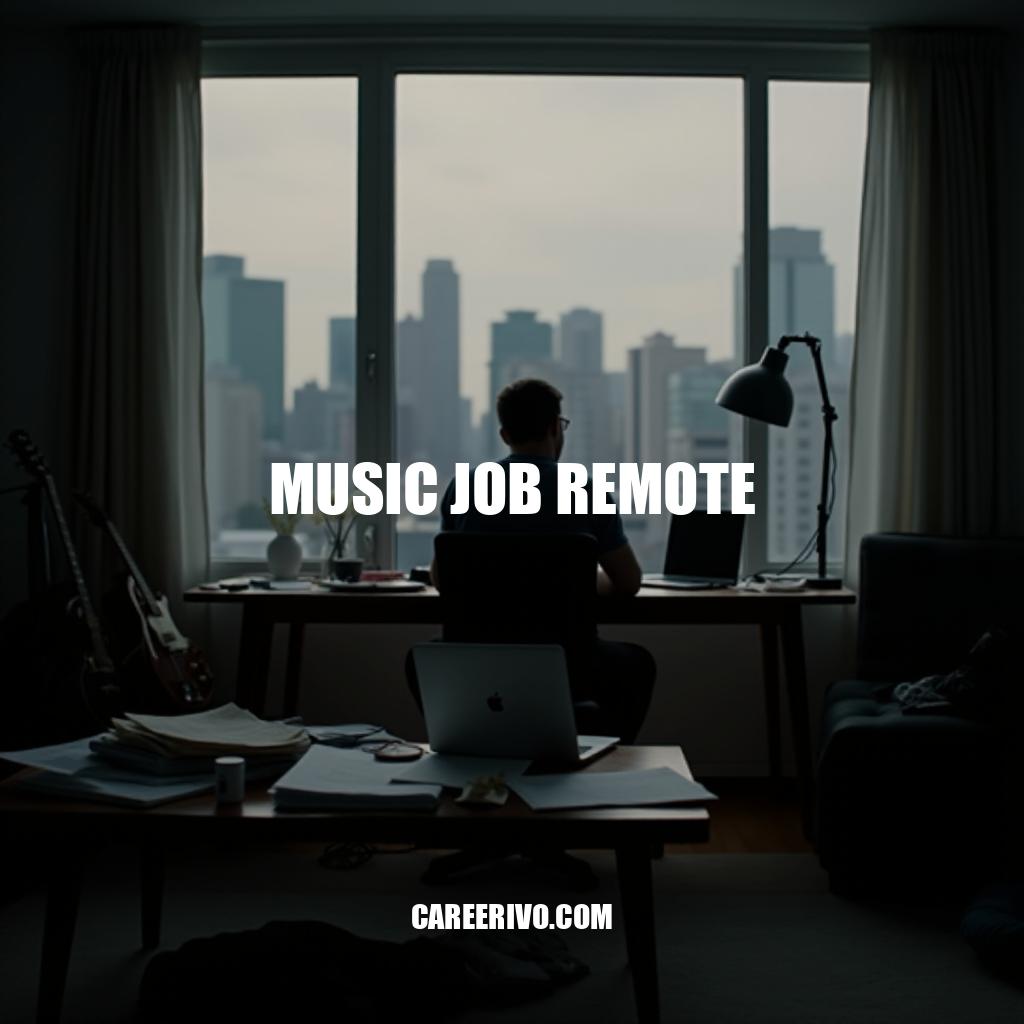
A ‘music job remote‘ means you can work from anywhere, without needing a physical office or studio. You can do things like music production, audio editing, marketing, writing, teaching, and even find new talent – all using digital tools and software. This is happening because of advances in tech and changes in how people think about work.
Working remotely in the music industry gives you a lot of freedom.
You can collaborate with people from different countries, access a global audience, and create your own schedule. It’s also easier for people to get into the industry who don’t live in big music cities. This model helps make the industry more diverse and innovative by bringing in new ideas and perspectives.
Exploring Opportunities in Music Job Remote
The music industry has embraced remote work in many ways, allowing professionals to contribute from virtually anywhere. Here are some exciting remote job opportunities in the field:
1. Online Music Teaching
Music educators can offer lessons via platforms like Zoom or Skype, teaching instruments, music theory, composition, or vocal techniques.
Private tutors or instructors for online courses and academies can reach students globally without needing a physical classroom.
2. Sound Design
Sound designers craft effects for films, video games, apps, and digital content. With a home studio, professionals can edit and produce audio remotely, collaborating with developers, filmmakers, and music producers across the world.
3.
Music Production
Producers can mix, master, and edit recordings remotely using digital audio workstations (DAWs) such as Logic Pro or Ableton Live. Many artists now send their tracks to producers for enhancement, and some producers even collaborate with musicians via online cloud-based platforms.
4. Remote Marketing & A&R (Artists & Repertoire)
-
Music Marketing: Social media managers, content creators, and digital marketers work remotely to promote artists, albums, and tours.
They craft social campaigns, analyze audience engagement, and oversee branding strategies.
-
A&R Reps: Scouting new talent is no longer limited to attending live performances. Many A&R representatives discover artists via YouTube, SoundCloud, or TikTok, connecting with them virtually and guiding their music careers remotely.
5. Music Journalism & Content Creation
Critics and bloggers analyze albums, interview artists, and report on industry trends—all from their home office.
Writers contribute to magazines, websites, and social media platforms with reviews, features, and opinion pieces.
6. Sync Licensing & Music Supervision
Professionals who specialize in matching songs with films, commercials, and TV shows can work remotely, negotiating sync licenses and curating soundtracks for various media projects.
7. Virtual Session Musician
Artists needing instrumental tracks often hire remote musicians to record their parts from their home studios.
Whether it’s laying down a guitar riff or a drum track, musicians collaborate virtually and deliver polished recordings from anywhere.
8. Podcasting & Audio Editing
With the rise of podcasts, many audio engineers, editors, and hosts work remotely, producing high-quality episodes with professional sound design and editing tools.
Would any of these remote roles fit your interests? The music industry’s digital transformation means creativity knows no boundaries!
🎶
The Music Industry is Undergoing a Significant Transformation
The music industry is undergoing a significant transformation, allowing professionals to thrive in a ‘music job remote’ environment. With advances in technology and changes in how people think about work, it’s now possible to work from anywhere without needing a physical office or studio.
Benefits of Remote Work
This shift offers numerous benefits, including freedom, flexibility, and access to a global audience. Remote workers can collaborate with people from different countries, create their own schedules, and contribute to the industry in various ways. The model also helps make the industry more diverse and innovative by bringing in new ideas and perspectives.
Remote Job Opportunities
Remote job opportunities abound in the music industry, including online music teaching, sound design, music production, remote marketing and A&R, music journalism and content creation, sync licensing and music supervision, virtual session musicianship, and podcasting and audio editing. These roles can be filled by professionals who are willing to adapt and learn new skills.
Succeeding in a ‘Music Job Remote’ Environment
To succeed in a ‘music job remote’, it’s essential to explore online platforms, build relevant skills, and leverage networking opportunities. This may involve learning digital tools and software, developing a strong online presence, and connecting with industry professionals through social media and virtual events.
The Future of Remote Work
The future of remote work in the music industry looks bright, with more and more professionals embracing this flexible and creative way of working. As technology continues to evolve, we can expect even more opportunities for remote collaboration and innovation. Whether you’re a musician, producer, or industry professional, there’s never been a better time to explore the possibilities of ‘music job remote’ and take your career to new heights.


